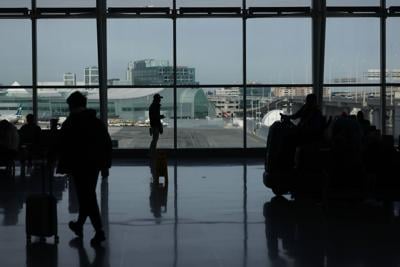It’s not just Canadians╠řÔÇö travellers from countries around the world are reconsidering visits to the United States as the Trump administrationÔÇÖs ÔÇťAmerica FirstÔÇŁ rhetoric and policies lead to global unease.
International visitor spending in the U.S. is expected to drop by $12.5 billion (U.S.), falling to $169 billion by the end of 2025, down from $181 billion last year, according to new data from the World Travel & Tourism Council (WTTC). This marks a 7-per-cent decline from 2024 and a 22 per cent drop compared to the last peak of American tourism in 2019.
The U.S., home to the worldÔÇÖs largest travel and tourism sector, is the only country among 184 economies analyzed by WTTC and Oxford Economics that is projected to see a decline in international visitor spending this year.
WTTC President and CEO╠řJulia Simpson╠řcalled the finding a “wake-up call” for the U.S. government, signaling that the world’s biggest travel and tourism industry is moving in the “wrong direction.”
“While other nations are rolling out the welcome mat, the U.S. government is putting up the ÔÇśclosedÔÇÖ sign,” said Simpson in a news release Wednesday.
As Trump repeats his rhetoric about making Canada the “51st state,” and targets the country that was once AmericaÔÇÖs closest ally with ever-changing tariffs, hundreds of thousands of Canadians╠řare deciding not to vacation or take day trips to the U.S. Incidents like the detention of European tourists at U.S. borders and a new policy requiring foreign nationals staying over 30 days to register have further discouraged international travel to America.
”(The decline) is not related to the economy in general,”╠řsaid Fr├ęd├ęric Dimanche, director of Ted Rogers School of Hospitality and Tourism Management at pc28╣┘═°Metropolitan University.╠ř“It’s really more a question of attitudes towards the U.S. and Trump, whether (travellers)╠řare against the policies, against the politics, whether they’re concerned about the security issues when crossing the border.”╠ř
March data from the U.S. Department of Commerce also shows steep declines year-over-year in arrivals from many of the U.S.ÔÇÖs key visitor markets: U.K. arrivals declined by 15 per cent from 2024; German arrivals╠řwere down 28 per cent; South Korean trips dropped by almost 15 per cent; and some other visitor populations, including Spain, Colombia, Ireland and the Dominican Republic, all saw drops between 24 per cent and 33 per cent.
“ItÔÇÖs part of a broader shift,” said Lorraine Simpson, a TV travel expert. “Travellers from Europe, Australia, and even within the U.S. itself are choosing alternative destinations, and itÔÇÖs not solely about cost or politics. ItÔÇÖs about how people feel when they travel: safe, welcome, and inspired.”
Francine Cochrane, co-owner of Playcation Travel, a Canadian travel agency which specializes in theme park vacations, said “our U.S. sales are softer than they were last year, but people are choosing to just travel to different places.”
She added that╠řpeople are “concerned based on what they’re hearing online” but neither she nor her clients╠řhave had negative experiences when crossing the border and travelling in the U.S. recently.
“Our U.S. sales are softer than they were last year, but people are choosing to just travel to different places,” said Cochrane.
The consequences of reduced international travel to the U.S. could be long-lasting. The WTTC forecasts it will take until at least 2030 for the U.S. tourism industry, worth nearly $2.6 trillion, to recover to pre-COVID levels.
Dimanche said consumer perceptions of the Trump administration won’t change over time, and it will take years for the tourism industry to rebuild tourist confidence.
“We are barely recovering now from the impact of COVID. It took five years basically to recover,” he said.
However, Dimanche said this may be an opportunity for Canada to attract international tourists who have chosen to travel to the U.S. in the past. He expects the international air carriers from Mexico and Europe to relocate some of their routes to new destinations that are now in demand.
“While this downturn in U.S. tourism is concerning, it could indeed be an opportunity for Canada and other destinations to capture attention,”╠řsaid TV travel expert Simpson, “but only if we focus on making people feel truly welcome, safe, and curious again.”





























To join the conversation set a first and last name in your user profile.
Sign in or register for free to join the Conversation